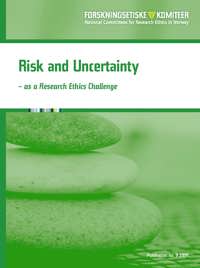
Booklet, 2009
Risk and Uncertainty – as a Research Ethics Challenge
Hovedforfattere: Roger Strand and Deborah Oughton
Bidragsytere: Morten Bremer Mærli, Anne I. Myhr, Dag O. Hessen and Matthias Kaiser The National Committee for Research Ethics in Science and Technology (NENT)
NB! Foreligger kun i digital utgave.
Preface
This booklet is prepared for NENT, the Norwegian Research Ethics Committee for Science and Technology, in order to provide background reading for Article 10 and 11 of the NENT Guidelines for Research Ethics in Science and Technology (2007). Its general outline has been approved by NENT, while the named authors bear responsibility for its specific content.
The scope of the NENT Guidelines can be recognised as broad and perhaps somewhat unusual in the sense of including some topics that are shared by few other research ethics guidelines. Articles 10 and 11 on “Uncertainty, Risk and the Precautionary Principle” are an example in this respect. Although the literature on scientific uncertainty within the fields of science and scholarship often draws the connection between ethics and uncertainty, few national or international research ethics guidelines do the same. Also for the practising scientist, the connection may be anything but immediate and self-evident, and it is often unclear where the responsibilities lie: with authorities, the users of technologies, or with the individual scientists?
For this reason, NENT has initiated the publication of this booklet. It aims at providing inspiration and directing the interested scientist, policy-maker and citizen to further reading on the topic; and at providing explanation and clarification for the affected parties of the guideline, that is, the scientists who now might discover that they are confronted with new ethical challenges. It is our belief, however, that nothing of what is presented below, is contrary to what the sociologist Robert Merton called the Scientific Ethos1, or what the philosopher Gaston Bachelard (1984 [1934]) called the Scientific Spirit. Indeed, we hold the view that good ethics is important for good science.
The exposition in this booklet is anything but comprehensive. The literature on risk, uncertainty and the precautionary principle is vast, diverse and expanding. Neither do we claim to give a representative portrait of the involved fields of science and scholarship. However, we would like to emphasise that there is a growing awareness that quantitative methods such as statistical measures and prediction error, might not cover all aspects of uncertainty, and that qualitative aspects of uncertainties need to be recognized and communicated. To acknowledge this, we have chosen the perspective of uncertainty characterization, communication and management that is more or less loosely connected with the so-called theory of post-normal science2 (Funtowicz and Ravetz 1993). This is not arbitrary, as this perspective has gained importance throughout the 1990s and 2000s. not the least because it has proved to be operational and given rise to a number of concrete tools, applications and implementations in science for policy.
However, it is important to remember that there is no unique truth and no single concept or theory of risk and uncertainty that is correct. Accordingly, our exposition may be taken to give positive guidance, but it should not be seen as the only way to understand or implement Article 10 and 11 of the NENT Guidelines. Indeed, the articles could be seen as an invitation to the scientific community to develop their own understandings and implementations of what we believe are important ethical challenges.
Roger Strand and Deborah Oughton